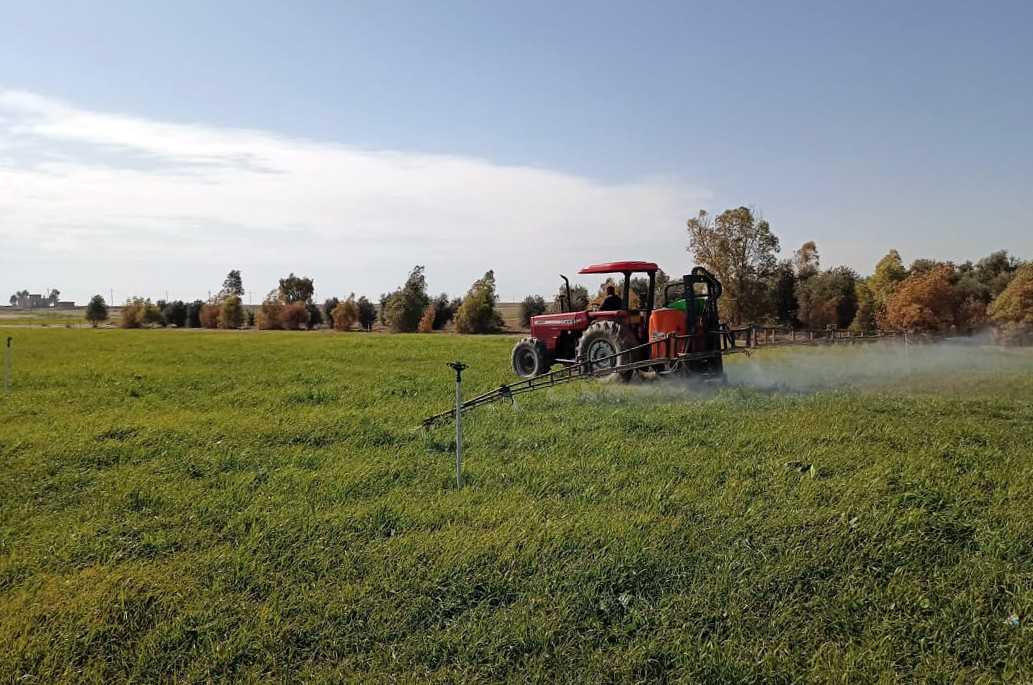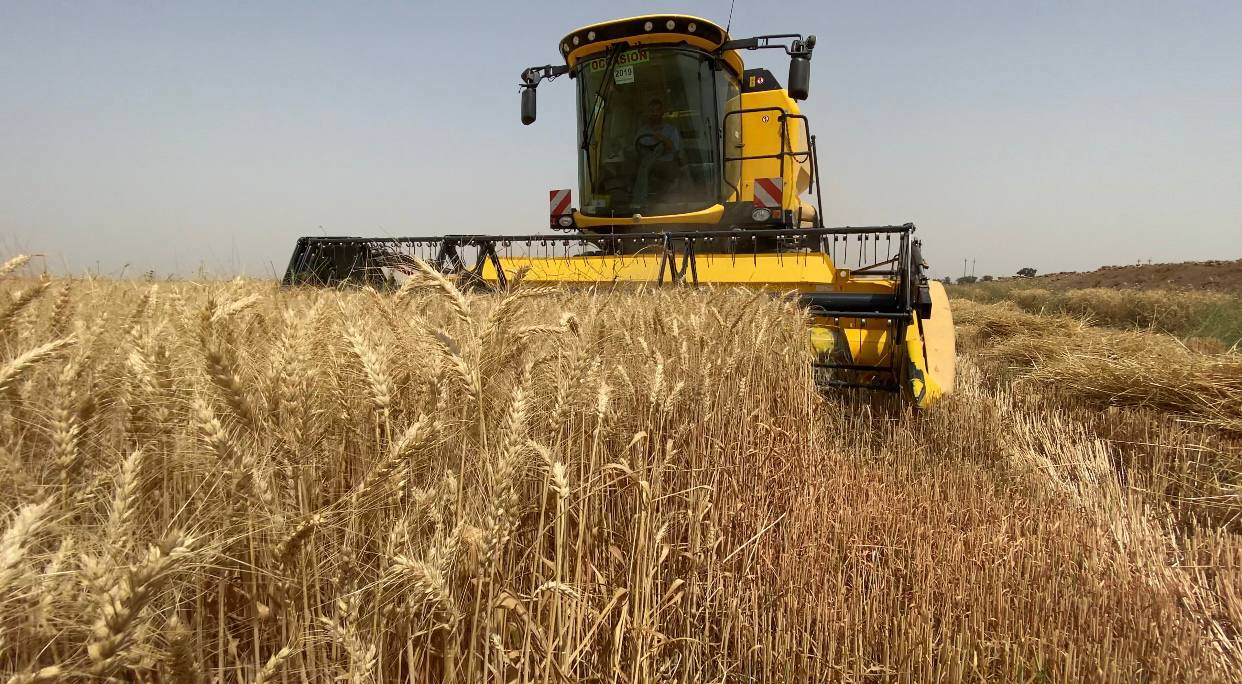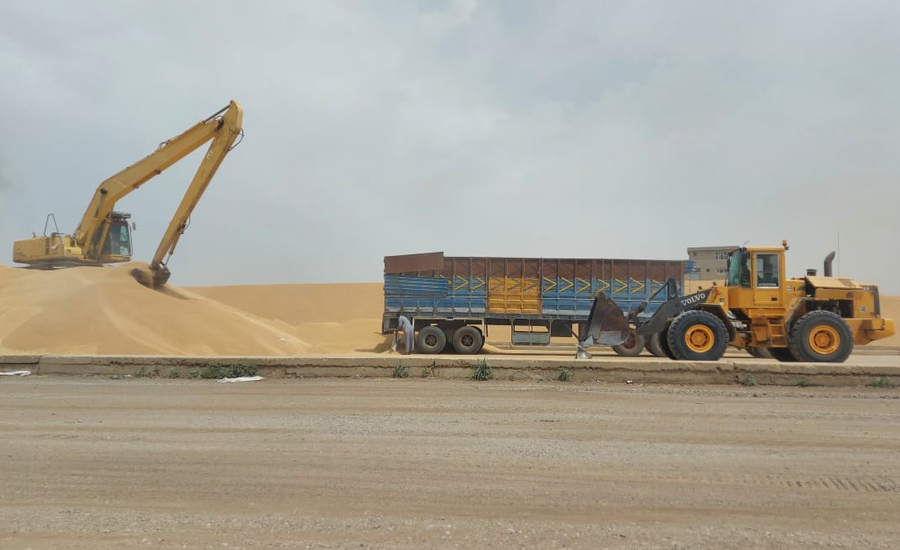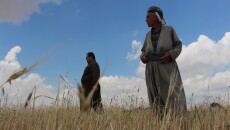Farmers in Makhmour suffer from the lack of sufficient fertilizers and chemicals reaching the district, which is one of the richest areas in Nineveh province in the production of grain crops. This coincides with the start of the wheat and barley planting season.
During this month, Makhmour farmers organized two demonstrations to protest the prevention of the buying and transporting fertilizers, chemicals, and seeds from the adjacent Iraqi Kurdistan Region IKR.
The crisis arose after the Iraqi Ministry of Agriculture issued a decision on November 20, 2022, prohibiting the transfer of chemical fertilizers from the IKR to the governorates of Iraq, and tasked the Ministry of Interior with taking the necessary measures to hold violators accountable.
Until two weeks ago, farmers were able to deliver fertilizers and chemicals from the IKR to the Makhmour district of Nineveh Governorate through “smuggling and paying bribes,” but the Iraqi government has tightened its procedures at checkpoints, making it difficult for farmers, even by smuggling.
Zewar Haj Rostom, who owns 85 hectares of agricultural land in Makhmour, says, “The season for growing grains has arrived, but I have neither fertilizer nor seeds. I need 50 tons of chemical fertilizer and 60 tons of seeds. If I do not get them now, it will be too late.”
There are 50,000 hectares of arable land in Makhmour, 19,000 hectares of which are irrigated lands, owned by over 3,000 farmers.
Makhmour district is one of the disputed areas under the Iraqi constitution. It is located southeast of the city of Mosul. It is one of the districts rich in wheat production, as production this year reached 200,000 tons.
Sirwan Jamil, a fertilizer and seed trader in Makhmour who at the same time owns 20 hectares of agricultural land in the district, said, “Two weeks ago, those in charge of the checkpoints were collecting amounts ranging between 600 to 700 dollars for each truck (loaded with fertilizers and seeds), but the Iraqi government does not allow it now since is prohibited according to the decision of the Ministry of Agriculture.”
According to the instructions of the Iraqi Ministry of Agriculture, with the exception of urea fertilizer and other prohibited fertilizers, other types of fertilizers are allowed to be imported into Iraq on the condition of obtaining an import permit, but their transportation from border crossings to warehouses is under the supervision of the National Security Service NSS and the Joint Operations Command.

A farmer sprays his land with pesticides, Nineveh, 2022. Media of Nineveh Agriculture Office
The transfer of fertilizers from warehouses to agricultural lands is under the supervision of the NSS, while it is not permitted to transfer any type of fertilizer from the IKR to the governorates of Iraq.
Assigning the NSS to monitor the operation is related to the security file, because some chemical fertilizers that are used in agriculture can also be used in the manufacture of explosives and are considered “dangerous” materials.
The Iraqi Council of Ministers made changes to some of the conditions and instructions at a meeting held on February 28, including permission for the entry of fertilizer (urea and Dab) from the IKR to Nineveh via the Mosul Dam checkpoint and to Kirkuk via the Darman checkpoint, according to applicable instructions.
The Ministry of Agriculture also argues that seeds are being smuggled
“The Ministry of Agriculture also argues that seeds are being smuggled... and the fertilizers that we import are of the compound type that is not used in making explosives,” Jamil said.
Sirwan says that he imported 45 tons of compound fertilizer from Jordan and has entry permits through all checkpoints to reach the Kurdistan Region, but they do not allow him to transport it to Makhmur.
Makhmour District was administered by the Kurdistan Regional Government KRG after 2003, but the security and administrative file became in the hands of the Iraqi government following the events of October 16, 2017.

The Iraqi government distributes fertilizers and seeds annually to farmers, but the problem, according to farmers, is that the date of distribution is late, and the quantity distributed is small and not proportional to the area of agricultural land.
“Last year, I received 20 tons of seeds from the government, while I planted about 60 tons of seeds,” Haji Rostam said, noting that each hectare needs 650 kilograms of seeds.
According to agricultural officials and farmers, the government sometimes does not acknowledge the amount of land specified by farmers and distributes small amounts of seeds to them, but KirkukNow was unable to determine how the amount of land was determined.
"The other problem is that the time when the government distributes chemical pesticides is late, and the wheat may be infected with pests and difficult to treat... so we try to remedy the matter with the start of the planting season, but as you can see, they do not allow us," Haji Rostam explained.
Rabie Yousef Elias, director of Nineveh Agriculture, said in an interview with him (KirkukNow) in 2022 that after the end of the control of the Islamic State in Iraq and the Levant (ISIS), and due to the lack of job opportunities in the cities, farmers residing in the cities returned to their villages and resumed agriculture.
“The agricultural sector in the governorate is witnessing an agricultural revolution, as the governorate now provides 60% percent of wheat and barley production in Iraq.”
Salman Hashem, an official in the Makhmour Agriculture Department, said, "We are aware of all their problems. We conveyed the farmers' voice to Baghdad and we received promises to find a solution to the problems within the next two weeks."
For his part, Rizgar Muhammad, the mayor of Makhmour, said that he personally spoke with the Iraqi Prime Minister. “I told him that what is being said about the smuggling of seeds and some dangerous materials is not true. The Prime Minister pledged not to let the farmers of Makhmour down.”
"I have not heard of bribes being paid at checkpoints to allow fertilizers to enter. This may have happened. That is why I spoke with judges and police, and the case must be investigated," he added.
Makhmur farmers refuse to surrender as they wait to find out what the officials' promises will lead to and then take their new position.






